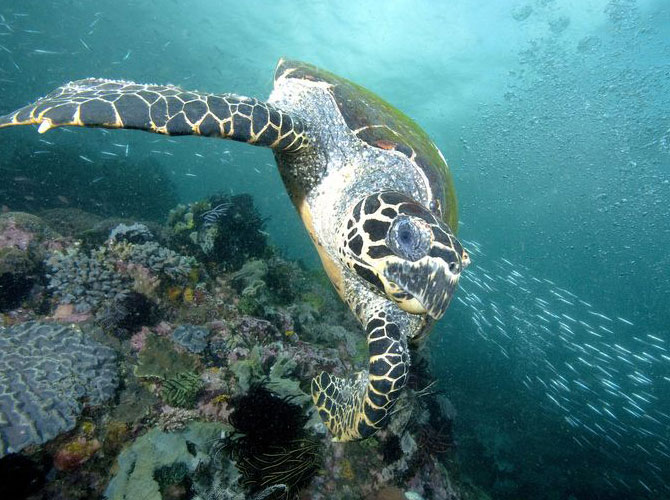
Mary Kay has partnered with The Nature Conservancy to empower women in ecotourism in the Solomon Islands, providing needed local economic opportunities and conservation support for the endangered hawksbill turtles
DALLAS, TX (November 24, 2020) – This November, Mary Kay Inc. is excited to announce its partnership with The Nature Conservancy to protect the critically endangered species of hawksbill sea turtles through the fostering of female-led ecotourism in the Solomon Islands. Through this collaboration with The Nature Conservancy, Mary Kay will support the skills development of a local women’s group, known as KAWAKI, facilitating food safety and personal hygiene training, critical for the launch of the Solomon’s first women-led eco-tourism venture, located in the remote Arnavon Islands.
The KAWAKI group is a local women’s organization in the Solomon Islands dedicated to marine conservation and turtle protection for the Arnavon Islands. Their mission is to unite women around conservation, culture and community to create a better future for their children and the generations to come. KAWAKI’s biggest conservation project is located in the Arnavon Islands, home to the largest rookery for hawksbill turtles in the South Pacific. The hawksbill is a species of turtle primarily threatened by poaching and habitat loss—specifically, the loss of nesting beaches due to coastal erosion driven by storms and sea-level rise. Tourism is a major development priority for the Solomon Islands, and with a growing number of tourists visiting the Arnavons each year, provincial authorities have identified the area as a prime opportunity for niche eco-tourism that can help lift communities out of poverty and provide the needed resources for effective turtle conservation. However, local infrastructure and marketing have not yet been developed for sustainable eco-tourism to accommodate the steady increase of visitors to the Arnavons.
Another challenge South Pacific nations, such as the Solomon Islands, face is limited access to health care. And with the spread of COVID-19, the situation got worse. Since the Solomon Islands government declared a national emergency earlier this year, many Solomon Islanders traveled from the capital city of Honiara back to their home villages. The KAWAKI women have been working with local Ministry of Health officers, church leaders and schools to provide training on handwashing and other precautionary measures to remote communities as well as resources such as soap, which is often difficult to obtain.
“Women’s participation and leadership are critical to safeguarding positive conservation outcomes and the health of at-risk communities,” said Trina Leberer, Director of The Nature Conservancy Pacific Islands Division. “We are incredibly honored to have Mary Kay’s support of the KAWAKI women’s group and our work in the Solomon Islands. Through this partnership, we are taking an integrated approach to conservation and preventive health, empowering local women in developing sustainable eco-tourism while supporting the health of remote communities who may not have access to medical facilities.”
Mary Kay’s support of this project will be twofold: strengthen local turtle conservation efforts and help both The Nature Conservancy and the KAWAKI women’s group create viable, equitable and sustainable livelihood opportunities through the provision of critical health and safety training for local communities in charge of protecting the endangered hawksbill turtle in the Arnavon Islands.
“As a leading advocate of women’s empowerment, and especially during this time of uncertainty, Mary Kay is honored to support the development of local female leaders. These women are pioneers of change in their homes and villages daily and are vital to the success of conservation initiatives,” said KK Chua, President of Mary Kay Asia Pacific. “We hope our investment in this program will help us prove the needed balance between ecological health and economic prosperity, helping local people and wildlife thrive together.”
Since 1992, The Nature Conservancy has worked with three local communities to protect the Arnavon Islands. A model for community conservation and the first marine national park in the Solomon Islands, the Arnavons was recently declared a Blue Park by the Marine Conservation Institute. The prestigious Blue Park Award “recognizes outstanding efforts by nations, non-profits, MPA managers, and local stake-holders that effectively protect marine ecosystems now and into the future.”
About Mary Kay
One of the original glass ceiling breakers, Mary Kay Ash founded her beauty company more than 56 years ago with three goals: develop rewarding opportunities for women, offer irresistible products, and make the world a better place. That dream has blossomed into a multibillion-dollar company with millions of independent sales force members in nearly 40 countries. Mary Kay is dedicated to investing in the science behind beauty and manufacturing cutting-edge skin care, color cosmetics, nutritional supplements and fragrances. Mary Kay is committed to empowering women and their families by partnering with organizations from around the world, focusing on supporting cancer research, protecting survivors from domestic abuse, beautifying our communities, and encouraging children to follow their dreams. Mary Kay Ash’s original vision continues to shine—one lipstick at a time.
About The Nature Conservancy
The Nature Conservancy is a global conservation organization dedicated to conserving the lands and waters on which all life depends. Guided by science, we create innovative, on-the-ground solutions to our world’s toughest challenges so that nature and people can thrive together. We are tackling climate change, conserving lands, waters and oceans at an unprecedented scale, providing food and water sustainably and helping make cities more sustainable. Working in 79 countries and territories, we use a collaborative approach that engages local communities, governments, the private sector, and other partners. To learn more, visit www.nature.org or follow @nature_press on Twitter.